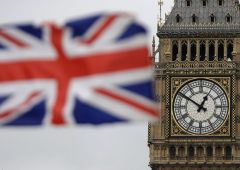Crypto Regulation Set for Major Shift, Says Ripple Co-Founder Chris Larsen
01.11.2024 14:00 1 min. read Alexander Stefanov
In a recent interview with CNBC, Ripple co-founder Chris Larsen expressed optimism about a significant shift in the regulatory landscape for cryptocurrencies.
He criticized Senator Elizabeth Warren’s stance on digital assets, labeling her approach a “misguided war on crypto” that has allowed other nations, such as Singapore and the United Kingdom, to take the lead while failing to adequately protect American consumers from risks like the FTX collapse.
However, Larsen believes that the tides are changing. He noted an emerging bipartisan consensus regarding the future of crypto, regardless of which political party secures the White House.
He emphasized the importance of supporting political leaders who advocate for pro-digital asset policies, highlighting his own contributions of nearly $12 million, mainly in XRP, to Vice President Kamala Harris, the Democratic presidential nominee.
Larsen expressed enthusiasm for Harris’ economic message, which he interprets as one that fosters innovation and positions American companies as leaders in the global market. He believes that her background in the Bay Area, known for its tech innovation, equips her with a unique perspective on the importance of nurturing the digital asset industry.
He is confident that a Harris Administration would adopt a markedly different approach to crypto regulation compared to the policies of the Biden Administration, which he views as ineffective.
-
1
Coinbase and Set Gemini to Expand in EU Under MiCA Rules
17.06.2025 13:00 2 min. read -
2
Wall Street Prepares for Stablecoin Integration as Regulatory Path Clears
19.06.2025 11:00 1 min. read -
3
U.S. Senate Moves Closer to Passing Landmark Stablecoin Legislation
17.06.2025 10:00 1 min. read -
4
Bangkok Opens Five-Year Tax Holiday for Crypto Traders
18.06.2025 18:00 2 min. read -
5
Norway Weighs Temporary Freeze on Crypto Mining to Conserve Energy
21.06.2025 8:00 1 min. read
Here is When the U.S. House Will Vote on Key Crypto Bills
Following the passage of President Donald Trump’s sweeping tax and spending bill, House Republicans are now setting the stage for a major push on cryptocurrency legislation.
SEC Chairman With Important Comments on Regulation, Crypto, and Trading
U.S. Securities and Exchange Commission (SEC) Chairman Paul Atkins has emphasized the agency’s continued focus on investor protection, addressing insider trading, market manipulation, and the evolving landscape of cryptocurrency regulation.
Arizona Governor Vetoes Bill, Related to State Crypto Reserve Fund: Here Is Why
Arizona Governor Katie Hobbs has officially vetoed House Bill 2324, a legislative proposal that aimed to create a state-managed reserve fund for holding seized cryptocurrency assets.
SEC Explores New Fast-Track Process for Token-Based ETFs
The U.S. Securities and Exchange Commission (SEC) is in the early stages of developing a standardized listing framework for token-based exchange-traded funds (ETFs), according to a July 1 report by journalist Eleanor Terrett.
-
1
Coinbase and Set Gemini to Expand in EU Under MiCA Rules
17.06.2025 13:00 2 min. read -
2
Wall Street Prepares for Stablecoin Integration as Regulatory Path Clears
19.06.2025 11:00 1 min. read -
3
U.S. Senate Moves Closer to Passing Landmark Stablecoin Legislation
17.06.2025 10:00 1 min. read -
4
Bangkok Opens Five-Year Tax Holiday for Crypto Traders
18.06.2025 18:00 2 min. read -
5
Norway Weighs Temporary Freeze on Crypto Mining to Conserve Energy
21.06.2025 8:00 1 min. read


